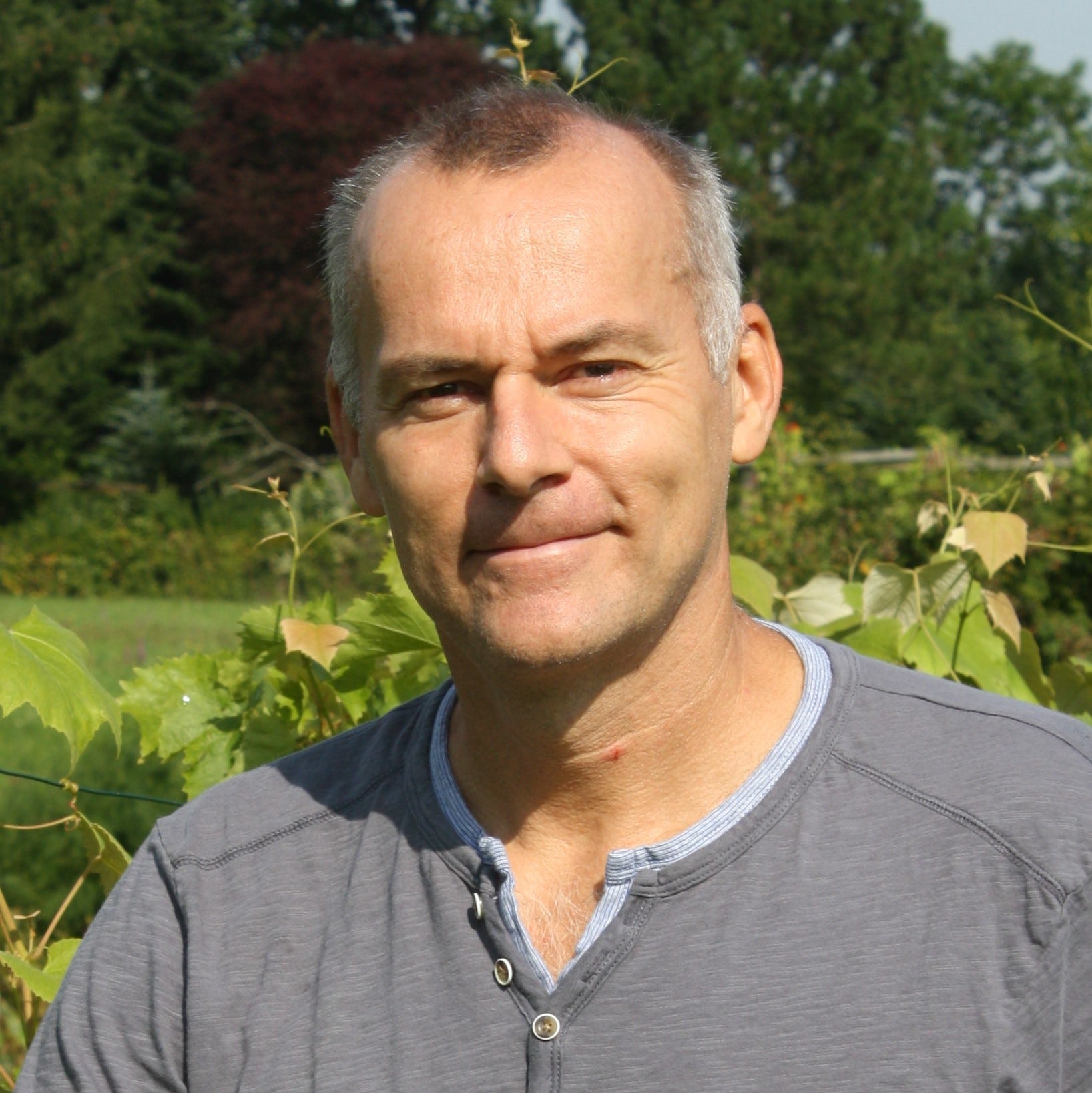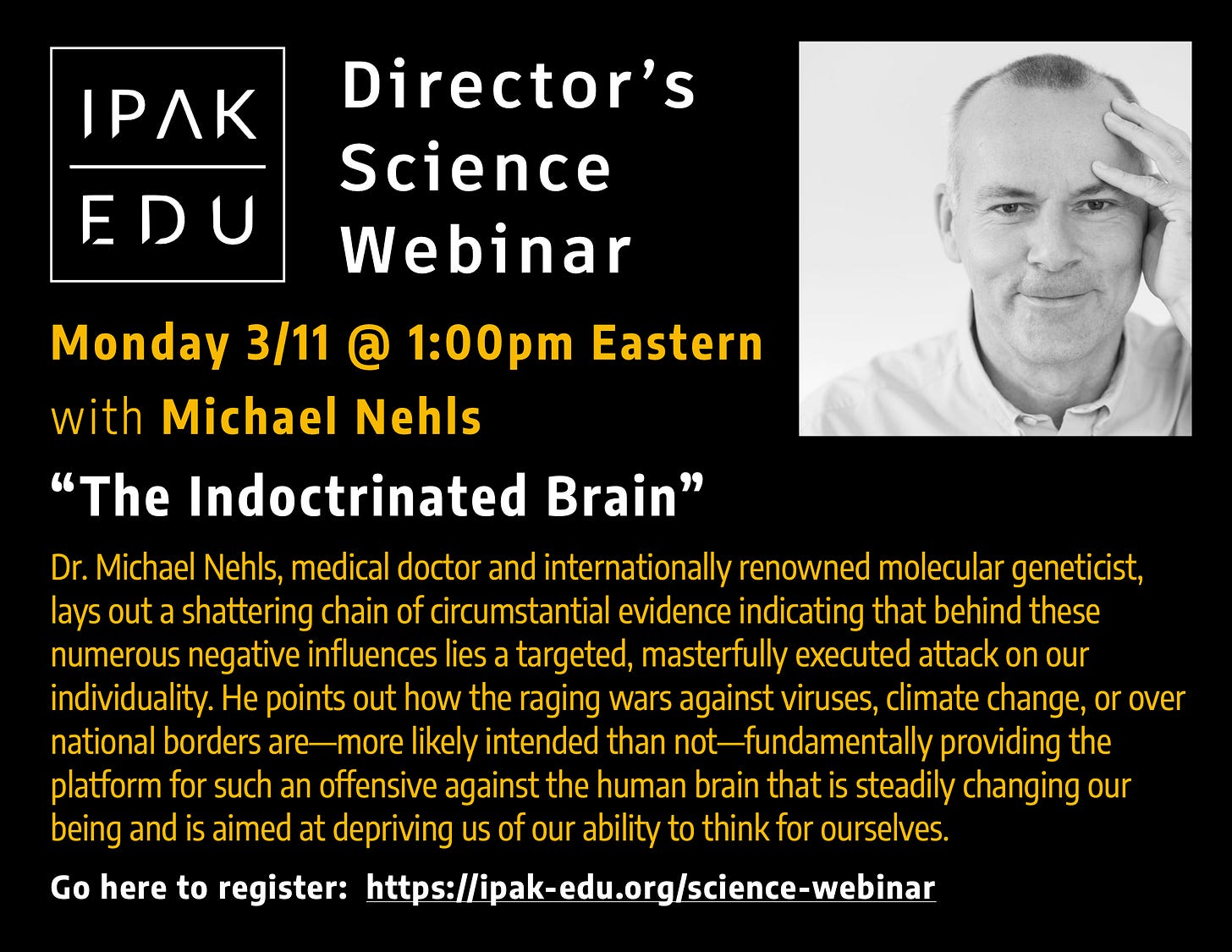The Indoctrinated Brain
Michael Nehls brings the science + strategies to protect your mental freedom
This is the 1st post on the March 11, 2024 session of the IPAK-EDU Director’s Science Webinar featuring the work of Dr. Michael Nehls.
Part 2 is here.
The March 11, 2024 session of the IPAK-EDU Director’s Science Webinar featured Dr. Michael Nehls. It was a superb talk—one of the best to date.
The talk he gave was, in a word, excellent. Organized and clear, tying together science and thought in a concise presentation that brought image and word together to clearly capture the lessons in his book. Nehls has a wonderful gift for making complex scientific topics accessible.
Dystopian was first coined in 1868 in a speech to British Parliament by John Stewart Mill. The implied meaning was couched as a reframing of ‘Utopians’:
It is, perhaps, too complimentary to call them Utopians, they ought rather to be called dystopians, or cacotopians. What is commonly called Utopian is something too good to be practicable; but what they appear to favor is too bad to be practicable.
Ironically, utopia literally means, ‘nowhere’. It is a combination of the Greek ou ‘not’ + topos ‘place’. Thomas More’s 1516 satire, entitled Utopia, imagined an island which represented a pinnacle of social, political, and legal perfection. The implication is that this perfect place is nowhere: a figment of the imagination. The juxtaposition of ‘utopia’ and ‘dystopia’ counterposes ‘no-place’ with ‘bad-place’. Ironically, the more common interpretation of utopia as ‘good-place’ stems from a misapplication of the Greek eu ‘good’ instead of ou ‘not’.
Utopia may be elusive, perhaps, but dystopia has a clearer footprint.
If one searches the internet for the terms ‘dystopia and now,’ you will find no shortage of hits, asking questions such as ‘Are We Living in a Dystopia?’, ‘Dystopia Is Upon Us. Are you ready?,’ and ‘Dystopia? How Close Are We?’.
Many recognize that the crises of now clearly resonate with the themes of dystopia in the larger human culture. It may not always be honestly acknowledged, but it is clearly widely felt.
From the first chapter of The Indoctrinated Brain, we are drawn into considering that we are indeed living in a time where dystopias have a shocking amount in common with current global events and machinations of the recent past. Nehls draws upon two seminal works of dystopian literature—Orwell’s 1984 and Huxley’s Brave New World—as interpretive frameworks to make comparisons with what we have all lived through.
Well, more accurately: still living through.
Nehls writes:
Here’s a clip from the introduction to his talk where he speaks to this.
Meet Dr. Michael Nehls.
The tagline to Nehls’ book, is: How to Successfully Fend Off the Global Attack on Your Mental Freedom.
Where the main title and cover art bear a darker, dystopian flavor, the subtitle beams with a decidedly brighter outlook. Powerful and hopeful.
If you appreciate the content, please consider giving this post a like. It's a simple gesture that doesn't cost a thing, but it goes a long way in promoting this post, spreading this content, and bringing awareness and understanding to others who might benefit. You are awesome. Be awesome.
Here are the first two shorts from the beginning of the lecture where Dr. Nehls lays down a framework for considering indoctrination and key aspects of decision-making, thought, and brain function.
Individuality, System 1: Zombie Mode, and System 2: Slow Thinking
Nehls observes that while both System 1 + System 2 are natural and desirable, if there is a desire to take over society, then System 2 cannot be allowed to function. He goes on to elaborate on the Autobiographical Memory Center and the connections between individuality, System 2 thinking, the frontal brain, and the vitally important hippocampus.
The Hippocampus: the Autobiographical Memory Center
To be continued!
Watch this space for more clips from the full talk.
Stay tuned.
Update: Click here to go to Part 2 of this series.
Information wants to be free—and over 90% of the content here is accessible to anyone. But everything takes care and time. If you like what you see, and you’re willing and able, consider leaving a tip. Every a little bit helps. Thank you!
Follow Dr. Michael Nehls on Substack and at michael-nehls.com
Paid subscribers to Twisting Strands will get access to a growing catalog of video shorts for an easy-to-watch, deeper perspective. Consider upgrading your subscription—you’ll be glad you did.
Subscribers to the IPAK-EDU Director’s Science Webinar get full access to webinar recordings, including this 2.5+ hour session with Dr. Michael Nehls
Your support of the webinar and IPAK-EDU makes this possible!







Restacked with this:
Although just about every IPAK-EDU Director’s Science Webinar exceed my expectations, the one which featured Dr. Michael Nehls was truly gratifying. Granted, I read his book well in advance of watching his webinar and didn't expect more mor "new dirt" to be turned by Dr. Nehls but I was resoundingly wrong. Sure, it made me double down on my commitment to keep my Vitamin D 25 Hydroxy levels above 50 ng/mL and embark upon a low dose Lithium supplement addition but what it didn't do was give me a keen insight into what must be a central endeavor for those of us who "got vaxxed"--which is to stay healthy and, more importantly, stay vigilant. This webinar placed me on the firmest of footing for doing so. It was that perfect "oomph" many of us need after reading a book. Can't thank the IPAK-EDU folks enough for this once-in-a-lifetime opportunity.
I am sad that l had ordered & paid for your book. After waiting for 3 months & making inquiries l found the supplier has gone bankrupt. I will reorder soon elsewhere.